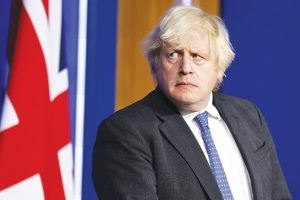Tory MPs describe Boris Johnson as a “greased piglet,†forever slipping from the clutches of his political enemies just when they think they have him cornered. The UK prime minister will require all his fabled survival skills after the Liberal Democratic Party overturned a large Conservative majority to secure a by-election victory with a 34% swing.
Many Conservative MPs have no personal loyalty to their leader, instead taking an entirely transactional view of the relationship. Hitherto, they have viewed the prime minister as the man with a magical connection to voters, who led them to a thumping victory at the last general election in 2019 by making inroads into former Labour Party strongholds.
But what if Johnson is no longer a winner? One of his backbench critics, Tory MP Roger Gale, didn’t mince his words on the BBC: “The Conservative party has a reputation for not taking prisoners. If the prime minister fails, the prime minister goes.â€
Gale added, “There have been two strikes already. One earlier this week in the vote in the Commons, now this. One more strike and he’s out.†101 Conservative MPs staged a huge revolt in the Commons against the prime minister’s new measures to fight the highly infectious omicron variant of Covid-19 sweeping the country.
According to John Curtice, the pollster with the best recent record for predicting UK elections, the Tory loss in North Shropshire, which they’ve held for most of the period since the Great Reform Bill of 1832, represents “a political earthquake of 8.5 out of 10 on the Richter scale.â€
The result, the seventh-largest swing since 1945, is the culmination of a challenging few weeks for Johnson, which began with his attempt to spare Owen Paterson, North Shropshire’s previous Tory MP, from suspension from the House of Commons for paid lobbying. Amid public outrage, the prime minister backtracked and his ally was forced to resign from Parliament, thus triggering the by-election.
Hot on the heels of that failure came newspaper revelations of parties in Downing Street and Whitehall held during lockdown last year when the rest of the country was forbidden from socialising under pain of 10,000-pound ($13,298) fines. The prime minister’s explanation for the funds that refurbished his official quarters has also been challenged by the ethical standards authorities.
Chaos at the heart of government, along with a perception, reinforced by the “partygate†scandals, that there is one law for Conservative ministers and another for the voters, has given the opposition Labour Party a sustained lead in opinion polls and damaged the prime minister’s personal ratings.
Johnson is his own worst enemy. After North Shropshire, his supporters hope he will restore order in No. 10 and work more closely with his Cabinet colleagues. But can he mend his ways? His unconvincing response to earlier embarrassments suggests not. Johnson thrives on chaos – since his chief adviser Dominic Cummings resigned, no one has been able to impose direction on his administration or discipline his personal entourage.
Meanwhile, Tory spokesmen blame “mid-term blues†for their current woes. They pray that the speedy rollout of the booster jabs against omicron will eventually restore Johnson’s standing with voters, just as the success of UK’s first mass vaccination did earlier this year.
Cabinet allies look across the Channel to the European Union for salvation. If the UK’s performance on vaccines once again outstrips that of the French, Germans and Italians, British voters may forgive and forget the prime minister’s mistakes. That’s a big if. The Tories also take some consolation from the fact that they lost to the Liberal Democrats, not Labour.
—Bloomberg
Martin Ivens was editor of the Sunday Times from 2013 to 2020 and was formerly its chief political commentator. He is a director of the Times Newspapers board
 The Gulf Time Newspaper One of the finest business newspapers in the UAE brought to you by our professional writers and editors.
The Gulf Time Newspaper One of the finest business newspapers in the UAE brought to you by our professional writers and editors.

